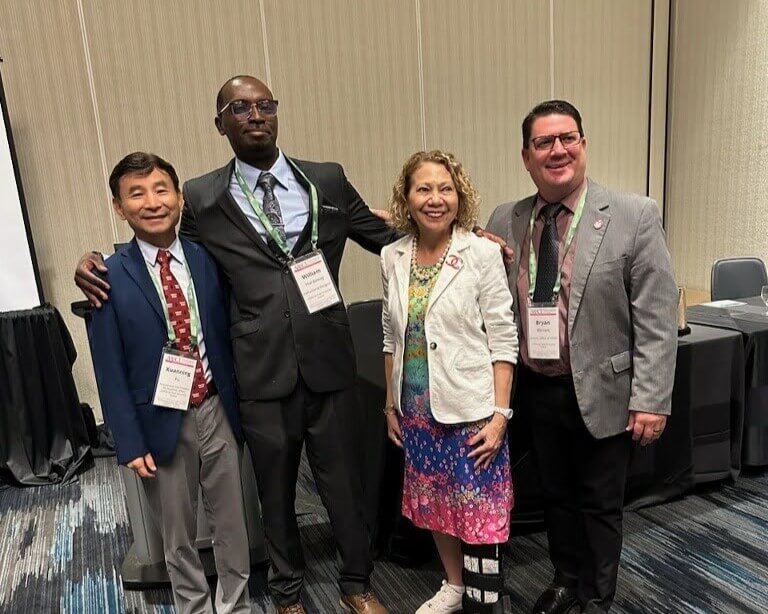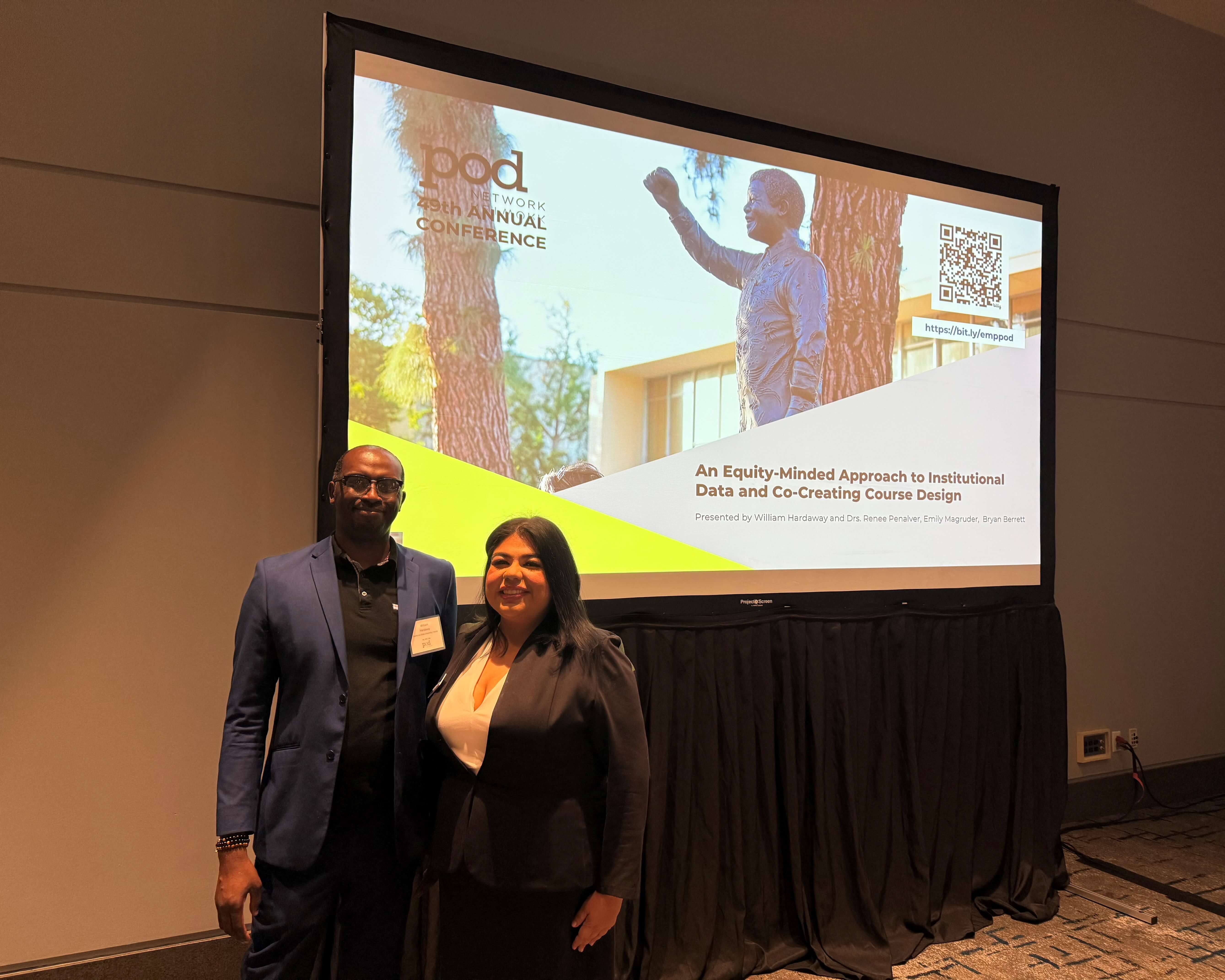A professional development course created by Fresno State instructional designer William Hardaway is teaching faculty across the California State University system how to use institutional data, human-centered design and equity-mindedness to inform teaching practices. Doing so allows faculty to understand the specific structural barriers that exist in higher education for underrepresented and Pell-eligible students, address those challenges in their teaching and classroom policies, and help reduce equity gaps and improve course completion rates.
Fresno State’s
Office of IDEAS (Innovation & Digital Excellence for Academic Success) launched the Equity-Minded Pedagogy (EMP) course for faculty in spring 2022 under Hardaway’s leadership, and the CSU Chancellor’s Office provided support to scale the course systemwide in fall 2023 with funding from the College Futures Foundation, ECMC Foundation and the Lumina Foundation.
The CSU is home to some of the most ethnically, economically and academically diverse students in the country, many of whom are first-generation college students, student parents, working students and students from historically underrepresented backgrounds. These nontraditional students face unique challenges on their academic journey, and EMP teaches faculty to put students’ needs first.
Through the EMP course, faculty assess their syllabus across multiple domains of equity-mindedness, participate in identity-mapping exercises, hear from student services professionals, participate in optional discussion forums and interview their own students about their experiences in the classroom, among other activities. From left: Fresno State Provost and VP for Academic Affairs Xuanning Fu, William Hardaway, CSU Chancellor Mildred García and Office of IDEAS Director Bryan Berrett at AASCU’s 2023 Academic Affairs Summer Meeting
From left: Fresno State Provost and VP for Academic Affairs Xuanning Fu, William Hardaway, CSU Chancellor Mildred García and Office of IDEAS Director Bryan Berrett at AASCU’s 2023 Academic Affairs Summer Meeting
“A big component of the EMP course is co-creation—course design decisions are driven and validated by students,” Hardaway says. “We’re encouraging faculty to literally have conversations with students about what makes attendance difficult for them, for example, and to use that information and available data to redesign their attendance and participation policies. This serves to support and empower students by allowing more flexibility on deadlines and modes for engaging in learning activities.”
Course participants put in about 25 hours of work over six to eight weeks. This includes at least eight hours of synchronous, facilitated sessions where they learn with facilitators and peers from across the system, and another 17 hours of independent learning activities.
The fully online course also teaches faculty members how to use institutional data dashboards to explore key student progress indicators across the CSU. This component was especially interesting to Chancellor’s Office staff as it aligned with other existing student success initiatives from the Division of Academic and Student Affairs.
For example, through using the dashboards, a faculty member who teaches a STEM course may discover inequities between male and female students. In an effort to identify why female students aren’t passing the course at the same rate as male students, they may have conversations with female students about their experiences in the course and modify their teaching approach to better support those students.
“Data-driven decision making has always been a part of the CSU’s Graduation Initiative 2025, and at the time [in 2023] the CSU Chancellor’s Office had received grants that were written to expand the culture around data use and institutional dashboards,” says Chenoa Woods, director of Research and Student Success Initiatives at the CSU Chancellor’s Office. “Scaling the Equity-Minded Pedagogy course was in parallel with the launch of the CSU-wide
Course Equity Portal, so we intentionally focused on the important student success issue of using available data to inform practice in multiple ways.”
While Hardaway designs the course curriculum and serves as the course lead along with campus facilitators, the Chancellor’s Office recruits participants through outreach to campus faculty development centers, disperses grant funding and offers the course through Canvas.
More than 500 faculty members across 17 CSUs have now taken the course, fostering more inclusive, equitable learning environments that support all students’ success.
The course is delivered within a community of practice in which faculty from multiple CSUs participate at a time, amplifying the university system’s efforts to build a more just and equitable educational system. This structure allows faculty to connect with other educators who are committed to equity and social justice and to learn from their experiences and strategies.
Renee Penalver, an assistant professor of psychology at Cal State Monterey Bay who has served as a campus facilitator since Hardaway piloted the course in 2022, says this unique cross-institutional collaboration has been invaluable.
 William Hardaway and Renee Penalver at the 2024 Professional and Organizational Development (POD) Network in Higher Education Conference “[Facilitating the EMP course] has been a really big learning experience in terms of navigating how the CSU works by connecting with faculty from other campuses and with the Chancellor’s Office,” she says. “Too often, faculty are operating in a silo, and this is a great opportunity to see what’s going on at other campuses in terms of equity-minded work.”
William Hardaway and Renee Penalver at the 2024 Professional and Organizational Development (POD) Network in Higher Education Conference “[Facilitating the EMP course] has been a really big learning experience in terms of navigating how the CSU works by connecting with faculty from other campuses and with the Chancellor’s Office,” she says. “Too often, faculty are operating in a silo, and this is a great opportunity to see what’s going on at other campuses in terms of equity-minded work.”
“And it’s not easy work,” Penalver continues. “The course teaches faculty how to identify their blind spots, which can be difficult, but William leads the course with a grace and gentleness I’ve never seen before.”
For his transformative work in advancing equity and inclusion in higher education, Hardaway was named the recipient of the 2024
Drivers of Educational Technology in California Higher Education (DET/CHE) Award in December. The DET/CHE Drivers Award recognizes individuals whose innovative contributions are driving significant positive change in teaching and learning.
“Hardaway’s work embodies the essence of transformational change in higher education,” says Xuanning Fu, Provost and Vice President for Academic Affairs at Fresno State. “His efforts have not only elevated faculty understanding of equity but have also created lasting, sustainable improvements in the way we support and teach our students. His vision and dedication make him a true leader.”
Looking forward, EMP designers and facilitators will be focused on increasing the course’s sustainability, scalability and innovation with the goal of empowering faculty and students to co-create equitable learning environments inside each and every class, in every learning modality.
Learn about professional development for CSU educators by connecting with CSU Innovative Teaching and Learning Programs.